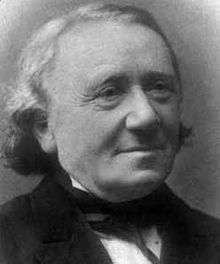Carl Paul Caspari
| Carl Paul Caspari | |
|---|---|
 | |
| Born |
8 February 1814 Dessau-Roßlau |
| Died |
11 April 1892 (aged 78) Kristiania |
| Nationality | Norwegian-German |
| Occupation | Theologian, teacher |
| Religion | Lutheran (formerly Judaism) |
Carl Paul Caspari (8 February 1814 – 11 April 1892) was a Norwegian neo-Lutheran theologian and academic. He wrote several books and is best known for his interpretations and translation of the Old Testament.
Early life
He was born Dessau of Jewish parentage and was brought up in the Jewish faith. From 1834 to 1838 he studied at Leipzig, where he acquired a knowledge of Arabic and Persian under Fleischer. Partly from the influence of fellow students, among whom was Franz Delitzsch, he adopted Christianity and was baptized in 1838. His Jewish training naturally fitted him for work in Old Testament exegesis, and he spent two years at Berlin under Hengstenberg.
Career
In 1842 he became doctor of philosophy at Leipzig, and in 1847 he accepted a call to Christiania, where he remained for the rest of his life, declining calls to Rostock in 1850, to Dorpat in 1856, and to Erlangen in 1857 and again in 1867. His linguistic ability enabled him speedily to master the Norwegian language, so that he could begin lectures in less than a year. He was made full professor in 1857. In his university work Caspari interpreted various books of the Old and New Testaments and treated Old Testament introduction. His lectures were inspiring, thorough, earnest, and bore evidence of a living Christian faith. In his exegesis and apologetics he followed Hengstenberg, and he remained to the end an opponent of modern critical scholarship. But his work and interest were not confined to the Old Testament field. In 1825 a Danish preacher, N. F. S. Grundtvig, propounded peculiar views, viz., that the baptismal formula, the renunciation, the Lord's Prayer, and the words of the Lord's Supper come directly from the Lord, have never been changed, and therefore stand above the Scriptures. The view found adherents in Denmark and Norway, and fear was felt that the formal principle of the Lutheran Church was in danger. Caspari undertook a careful investigation of the questions connected with the baptismal formula, and its history and thus was led on to extensive ecclesiasticopatristic studies. He published a long series of articles and books as the result, most of them in the Norwegian language. Under the auspices of the Norwegian Bible Society he assisted in making a new translation of the Old Testament, which was completed for the seventy-fifth anniversary of the Society, 26 May 1891; at the time of his death he was working on the New Testament. He was a member of the central committee of the Bible Society, president of the Norwegian mission among the Jews, and belonged to numerous learned and honorary societies. He died in Christiania.
Selected publications
In Norwegian he published a translation of the Book of Concord (Christiania, 1861); an essay upon the Wandering Jew (1862); a commentary on the first six chapters of Isaiah (1867); a historical essay on the confession of faith at baptism (1871); on Abraham's trial and Jacob's wrestling with God (1871); on Abraham's call and meeting with Melchizedek (1872); a volume of Bible essays (1884); etc. With his friend G. C. Johnson he established in 1857 the Theologisk Tidskrift for den evangelisk-lutherske Kirke i Norge, of which a volume appeared annually till shortly before Caspari's death. Most of the articles were written by the editors, and in this and other periodicals a large number of Caspari's writings were originally published.
- "A commentary on Obadiah" (in Delitzech and Caspari's Exegetisches Handbuch zu den Propheten des Alten Bundes, Leipzig, 1842);
- Grammatica Arabica (2 parts, Leipzig, 1844–48; 5th Germ. ed., by August Müller, Halle, 1887; Eng. ed., by W. Wright, London, 1859–62, 1874–75; by W. Robertson Smith and M. J. de Goeje, Cambridge, 1896–98)
- Beiträge zur Einleitung in das Buch Jesaia und zur Geschichte der jesaianischen Zeit (vol. ii, of Delitzseh and Caspari's Biblisch-theologische und apologetisch-kritische Studien, Berlin, 1848)
- Ueber den syrischephraimitischen Krieg unter Jotham und Ahas (Christiania, 1849)
- Ueber Micha den Morasthiten und seine prophetische Schrift (2 parts, 1851–52)
- Ungedruckte, unbeachtete und wenig beachtete Quellen zur Geschichte des Taufsymbols und der Glaubensregel (3 vols., 1866–75)
- Zur Einführung in das Buch Daniel (Leipzig, 1869)
- Alte und neue Quellen zur Geschichte des Taufsymbols und der Glaubensregel (Christiania, 1879); an edition of Martin of Braga's De correctione rusticorum (1883)
- Kirchenhistorische Anecdota nebst neuen Ausgaben patristischer und kirchlich-mittelalterlicher Schriften (1883)
- Eine Augustin fälschlich beigelegte Homilia de sacrilegiis (1886)
- Briefe, Abhandlungen und Predigten aus den zwei letzten Jahrhunderten des kirchlichen Alterthums und dem Anfang des Mittelalters (1891)
- Das Buch Hiob in Hieronymus's Uebersetzung (Christiania, 1893).
- Der Glaube an der Trinität Gottes in der Kirche des ersten christlichen Jahrhunderts nachgewiesen (Leipzig, 1894).
References
-
 This article incorporates text from a publication now in the public domain: Jackson, Samuel Macauley, ed. (1914). "article name needed". New Schaff–Herzog Encyclopedia of Religious Knowledge (third ed.). London and New York: Funk and Wagnalls.
This article incorporates text from a publication now in the public domain: Jackson, Samuel Macauley, ed. (1914). "article name needed". New Schaff–Herzog Encyclopedia of Religious Knowledge (third ed.). London and New York: Funk and Wagnalls.